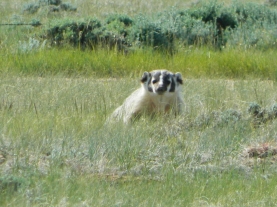Graham Readfearn—Desmog Blog
“From hot to fractionally less hot, here are the planet’s ten warmest years on record – 2015, 2014, 2010, 2005, 2007, 2013, 2009, 1998, 2002 and 2006.
These are the numbers according to NASA and include measurements taken on land and at sea in a record that goes back to the year 1880.
Now that’s a pretty remarkable run of hot years for an era when, according to the rusted-on professional climate science denialists, global warming was supposed to have stopped.
But what are the chances of getting a run of “hottest on record” years like that – 14 of the 16 hottest years all happening since 2000 – without all the extra greenhouse gases that humans have been judiciously stockpiling in the atmosphere and oceans?
Well, the chances of this happening, climate scientist Professor Michael Mann tells me, are… wait for it… one-in-13000. Mann, of Penn State University, is the lead author of a new paper published in Nature’s Scientific Reports.
The study takes in data up to 2014, when the chance of that hot streak was one-in-10000. Since the study was submitted, Mann has re-run the numbers to include the new “hottest year” of 2015, giving us the one-in-13000 number.”
Hillary won several primary delegates with a 15 in 1000 odds for coin tosses. Odds are just that—odds. They matter only in Las Vegas and other gambling institutions. “Odds” do not prove causality. Even p-values are of very limited use in establishing cause. In the past, a low p-value was said to show causality, but over time, the goal was to produce a p-value of a desired size and one could manipulate the data to get that answer. Plus, some low p-values “proved” theories that could not be verified with additional research. It happens over and over that what is a 1 in a million chance happens, sometimes three or four times in a short period. There is NOTHING in this study that proves humans are causing anything or that the globe will get hotter. Statistics are highly manipulative and can be used to prove anything you like if you care nothing about science or procedure. My college statistics books included “How to Lie with Statistics”. We also covered in marketing psychology how to influence people by presenting statistics in a certain way and getting them to buy our products. None of this is about actual “hard” science—it’s guesswork with a computer and carefully chosen wording to SELL the product. Science is about sales now, not truth.
The same technique is used with so-called extreme events. A 100 year flood does not mean a flood of this size occurs once in a hundred years, but people believe it does because that’s what it sounds like. It means a flood of this size has a 1% chance of occurring in any one year. A flood of said size can occur two years in row, also.
Science has less than 200 years of temperature measurement, much of it adjusted or estimated, yet we are to believe that the current warm years are the harbinger of doom. That’s no rational. We do not know any such thing.

What are the odds of seeing me?
Thanks again for a well thought out essay.
I am not a math guy but I can see if there is any cyclic process involved there are going to be periods of maximums and minimums. The argument about having ten of the hottest years on record in the 21 century is like saying the five hottest hours yesterday were 11 Am to 4 PM–What are the odds ?